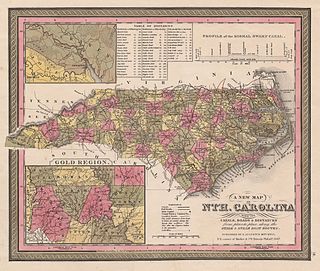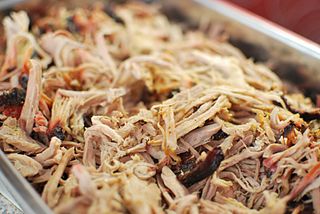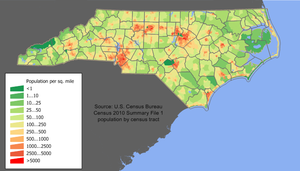
North Carolina is a state in the Southeastern region of the United States. It borders Virginia to the north, the Atlantic Ocean to the east, South Carolina to the south, Georgia to the southwest, and Tennessee to the west. The state is the 28th-largest and 9th-most populous of the United States. Along with South Carolina, it makes up the Carolinas region of the East Coast. In the 2020 census, the state had a population of 10,439,388. Raleigh is the state's capital and Charlotte is its largest city. The Charlotte metropolitan area, with a population of 2,728,933 in 2020, is the most-populous metropolitan area in North Carolina, the 21st-most populous in the United States, and the largest banking center in the nation after New York City. The Raleigh-Durham-Cary, NC Combined Statistical Area is the second-largest metropolitan area in the state and 32nd-most populous in the United States, with a population of 2,238,315 in 2020, and is home to the largest research park in the United States, Research Triangle Park.

Raleigh is the capital city of the U.S. state of North Carolina and the seat of Wake County. It is the second-most populous city in North Carolina, after Charlotte. Raleigh is the tenth-most populous city in the Southeast, the 41st-most populous city in the U.S., and the largest city of the Research Triangle metro area. Raleigh is known as the "City of Oaks" for its many oak trees, which line the streets in the heart of the city. The city covers a land area of 147.6 sq mi (382 km2). The U.S. Census Bureau counted the city's population as 467,665 in the 2020 census. It is one of the fastest-growing cities in the United States. The city of Raleigh is named after Sir Walter Raleigh, who established the now-lost Roanoke Colony in present-day Dare County.

Chapel Hill is a town in Orange and Durham counties in the U.S. state of North Carolina. Its population was 61,960 in the 2020 census, making Chapel Hill the 17th-most populous municipality in the state. Chapel Hill, Durham, and the state capital, Raleigh, make up the corners of the Research Triangle, with a total population of 2,106,463 in 2020.

Orange County is a county located in the Piedmont region of the U.S. state of North Carolina. As of the 2020 census, the population was 148,696. Its county seat is Hillsborough.

Durham is a city in the U.S. state of North Carolina and the county seat of Durham County. Small portions of the city limits extend into Orange County and Wake County. With a population of 283,506 in the 2020 census, Durham is the 4th-most populous city in North Carolina, and the 71st-most populous city in the United States. The city is located in the east-central part of the Piedmont region along the Eno River. Durham is the core of the four-county Durham-Chapel Hill, NC Metropolitan Statistical Area, which had a population of 649,903 at the 2020 census. The Office of Management and Budget also includes Durham as a part of the Raleigh-Durham-Cary, NC Combined Statistical Area, commonly known as the Research Triangle, which had a population of 2,043,867 in 2020.
The U.S. state of North Carolina is known particularly for its history of old-time music. Many recordings were made in the early 20th century by folk song collector Bascom Lamar Lunsford. Influential North Carolina country musicians like the North Carolina Ramblers and Al Hopkins helped solidify the sound of country music in the late 1920s, while influential bluegrass musicians such as Earl Scruggs and Doc Watson came from North Carolina. Arthur Smith had the first nationally syndicated television program which featured country music. He composed "Guitar Boogie", the all-time best selling guitar instrumental, and "Dueling Banjos", the all-time best selling banjo composition. Country artist Eric Church from the Hickory area, has had multiple No. 1 albums on the Billboard 200, including Chief in 2011. Both North and South Carolina are a hotbed for traditional country blues, especially the style known as the Piedmont blues. Elizabeth Cotten, from Chapel Hill, was active in the American folk music revival.

Research Triangle Park (RTP) is the largest research park in the United States, occupying 7,000 acres (2,833 ha) in North Carolina and hosting more than 300 companies and 65,000 workers. It is owned and managed by the Research Triangle Foundation, a private non-profit organization.

The Research Triangle, or simply The Triangle, are both common nicknames for a metropolitan area in the Piedmont region of the U.S. state of North Carolina. Anchored by the cities of Raleigh and Durham and the town of Chapel Hill, the region is home to three major research universities: North Carolina State University, Duke University, and the University of North Carolina at Chapel Hill, respectively. The "Triangle" name originated in the 1950s with the creation of Research Triangle Park located between the three anchor cities, which is the largest research park in the United States and home to numerous high tech companies.
WUNC is a listener-supported public radio station, serving the Research Triangle area of North Carolina. It is licensed to Chapel Hill and is operated by the University of North Carolina at Chapel Hill. On weekdays, WUNC carries National Public Radio, American Public Media, Public Radio Exchange, and BBC programming in an "all-news-and-information" format, including shows such as All Things Considered, Morning Edition and Fresh Air. On weekends, in addition to NPR weekend shows, WUNC broadcasts locally produced folk music programming. The longest-running continuously produced program offered by the station is Back Porch Music, a weekly folk and traditional music program. WUNC holds periodic on-air fundraisers seeking listener contributions.

The culture of the Southern United States, Southern culture, or Southern heritage, is a subculture of the United States. From its many cultural influences, the South developed its own unique customs, dialects, arts, literature, cuisine, dance, and music. The combination of its unique history and the fact that many Southerners maintain—and even nurture—an identity separate from the rest of the country has led to it being one of the most studied and written-about regions of the United States.

The Piedmont Crescent, also known as the Piedmont Urban Crescent, is a large, polycentric urbanized region in the U.S. state of North Carolina that forms the northern section of the rapidly developing Piedmont Atlantic megalopolis, a conurbation also known as the "I-85 Boombelt", which extends from the Raleigh area in North Carolina, southwards to Atlanta, Georgia in the southeastern United States.
Central North Carolina, also known as the Piedmont, is a region of North Carolina. It is located between the Mountains to the west and the Coastal Plain to the east. It is the most populous region of the state, containing Charlotte, the state capital of Raleigh, and Greensboro. These cities form the Piedmont Crescent region, much of which parallels I-85. The geography of the Piedmont primarily consists of rolling hills. Historically the region has been known for furniture and textile manufacturing.
Demographics of North Carolina covers the varieties of ethnic groups who reside in North Carolina and relevant trends.

The Lexington Barbecue Festival is a one-day food festival held each October in Lexington, North Carolina, the "Barbecue Capital of the World." Each year it attracts as many as 200,000 visitors to the uptown Lexington area to sample the different foods from up to 20 different area restaurants, dozens of visiting food vendors, and hundreds of other vendors.

In 2019, North Carolina's total gross state product was around $591 billion.

The Piedmont Atlantic megaregion is a neologism created by the Regional Plan Association for an area of the Southeastern United States that contains parts of the states of Alabama, Georgia, Tennessee, South Carolina, and North Carolina. The region includes the Atlanta, Birmingham, Charlotte, Memphis, Nashville, Research Triangle (Raleigh-Durham), and Greensboro-Winston-Salem-High Point metropolitan areas. The megaregion generally follows the Interstate 85/20 corridor. According to Georgia Tech, the Piedmont Atlantic represents over 12 percent of the total United States population and covers over 243,000 square miles (630,000 km2) of land.

The Charlotte metropolitan area, sometimes referred to as Metrolina, is a metropolitan area of the U.S. states of North and South Carolina, containing the city of Charlotte. The metropolitan area also includes the cities of Gastonia, Concord, Huntersville, and Rock Hill as well as the large suburban area in the counties surrounding Mecklenburg County, which is at the center of the metro area. Located in the Piedmont, it is the largest metropolitan area in the Carolinas, and the fourth largest in the Southeastern United States. The Charlotte metropolitan area is one of the fastest growing metropolitan areas in the United States.
This article is intended to give an overview of transportation in North Carolina.

Barbecue is an important part of the heritage and history of the U.S. state of North Carolina. It has resulted in a series of bills and laws that relate to the subject, and at times has been a politically charged subject. In part, this is due to the existence of two distinct types of barbecue that have developed over the last few hundred years: Lexington style and Eastern style. Both are pork-based barbecues but differ in the cuts of pork used and the sauces they are served with. In addition to the two native varieties, other styles of barbecue can be found throughout the state.

WNCB, known as "B93.9", is a country music radio station that serves the Raleigh-Durham market of North Carolina. It is owned and operated by iHeartMedia, Inc., whose sister stations include WDCG, WTKK, WRDU, and W237BZ.















